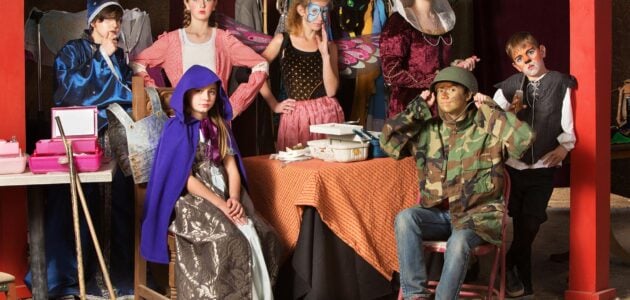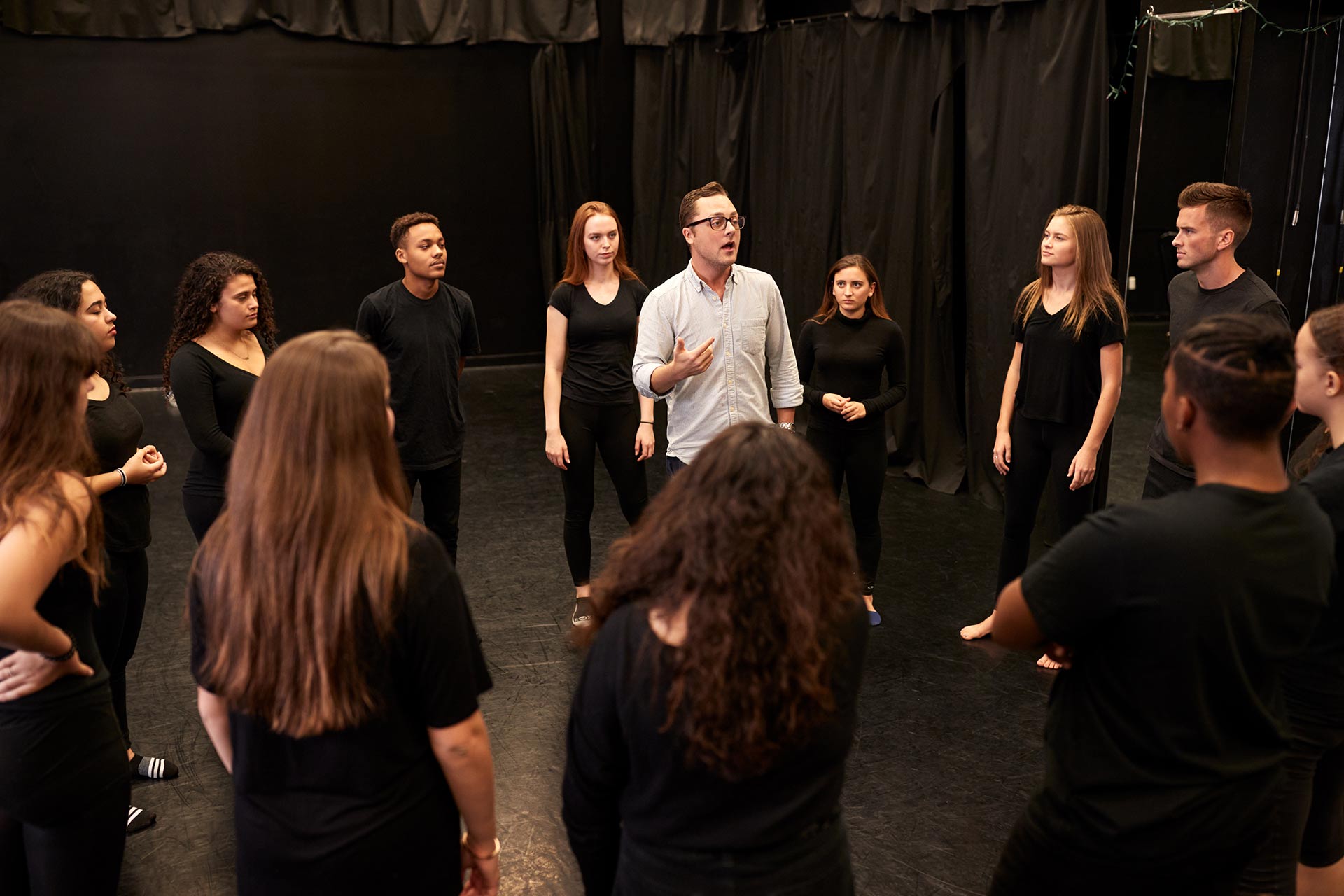
Teaching Status to Teens
When it comes to teaching drama, teenagers are hungry, expressive, and eager to learn and this makes them incredible acting students. More often than not, their talent will surprise you! Whether you’re a high school drama teacher looking for new things to teach, directing a theatrical production with youth, coaching young actors for auditions, or hoping to gain a little insight into what it means to work with teens, this lesson plan could be for you!
My students love these activities; we continually cycle back to what we’ve learned from them and they always ask to play these games.
To Start: Trust and Play
Never underestimate how intimidating it can feel for an unseasoned young performer to have to improvise, speak out, or make choices in front of their peers. If you have the chance to work with a group of teens for a long period of time, start by doing some trust exercises.
My main focus when I’m teaching is always “play.” Acting should feel like an adventure, and so laying some trust exercises down is helpful so that the group can feel safe to take risks, say something weird or silly, make “mistakes,” which we all know don’t actually exist. There’s only strong or weak choices, never right or wrong!
If you can, establish improv rules in a previous session so they are well-equipped to engage in long-form improvisational activities. Some great games I recommend for this include games like “Yes, Let’s!” or “Yes, And!” Here you can establish that these types of improv rules aren’t for improv sport comedy; “being funny,” is not the objective.
Brainstorm!
To start your status class, have a brain storm. What makes a character high or low status? Remind them that it is often little to do with socio-economic status; a person who is poor can be high status and someone who is wealthy can be low status. Gather a list of high and low status characters from popular movies, celebrities, books or plays! If you’ve done any commedia dell’arte, there’s lots you can pull from these archetypes as well!
Warm-Up: Fashion Show
Line up the class in 2 rows to create a runway. Put on some awesome music (I usually let them pick). Have them walk down the runway as both high and low status characters. Get them to cheer on each other, but really get them to focus on physicality. Once everyone has gone twice, debrief.
Talk about what physical traits they noticed that come along with each status. High status has little fidgeting, moves slower and smoother, less head movements, has steady energy, doesn’t have to try very hard and takes up lots of space.
Low status is the opposite: fidgety, awkward, frequent head movements, afraid to make eye-contact, moves quickly/doesn’t want to be seen, tries to take up little space, and more! See what else they come up with!

Improv: High and Low Status
● Before class, prepare a stack of Post-It notes lettered/ numbered like a deck of cards. 2s are low, Aces high.
● Set the scene: you’re all students at a high school library during exams. Discuss what each card represents. Aces are popular and well known amongst the students; they are the “everything” student who is president of student council, does band, drama, sports, gets good grades; teachers and peers love them. Remember, high status characters don’t try hard and aren’t very self-conscious, so they aren’t bullies! 2s are the quiet/shy freshmen. Face cards are maybe jocks or seniors.
● Another option: You’re at a Corporate Christmas party. Aces are the CEOs, 2s are the bus boys. Face cards are executives. Etc.
● Make sure everyone has a rough understanding of the pecking order before you start.
● If you have time, brainstorm how a K might be different than a Q or J or 10. What does it mean to be an 7-9? etc. It’s also fine to save these discussions for after the improv.
● Each person gets one of the Post-Its and sticks it to their forehead, but isn’t allowed to look at it.
● The point of the game is to enact a long-form improvised scene and treat each other like what it says on their card. By the end of the activity, they should have a bit of an idea of which card they are!
● Let the scene unfold and don’t interject with coaching moments. If you need to help, enter the scene in character as either the Librarian announcing that exams are coming up, or as the owner of the hotel where the Corporate party is at. Thank everyone for coming and give them something to do if they are stuck. For example, “Make sure you study hard for finals, and please remember to return the books to the shelves when you are finished.” Or, “Thank you so much for choosing us to host your party, we have some staff to bring you what you need, help yourself to the canapes and drinks! Let me know if you need anything and enjoy!”
● It can last from 10-30 minutes.
Debriefing
After the improv has finished, it’s time for a discussion. Here’s a list of things you can ask:
● What did it feel like to be your number?
● How did it feel as a low value card to be around a high value card and vice versa?
● What did you notice amongst the other cards around you?
● What personality traits came out with each card?
● How much anxiety did your card experience?
For further discussion, talk about what each card’s personal objectives might be. Maybe a 2 card wants to be invisible. Maybe an Ace wants everyone to be having a great time. 10 cards are usually the most desperate and interesting; they often want to distance themselves from the other number cards and try really hard to get the Face cards to notice them (often with little success!) 7-9s can take on a managerial role of the lower cards. They can also sometimes be protective of the lower cards and definitely know the pecking order pretty well.
If you are working on scenes or monologues, it can be incredibly useful to incorporate these teachings. Remind your students of the different cards and the physicalities and feelings associated with each card. If you need an actor to be more desperate, remind them of that 10 card! If someone is playing a high status character, remind them of the Ace! It’s always so exciting to see where this kind of work can go.

Leave a Reply